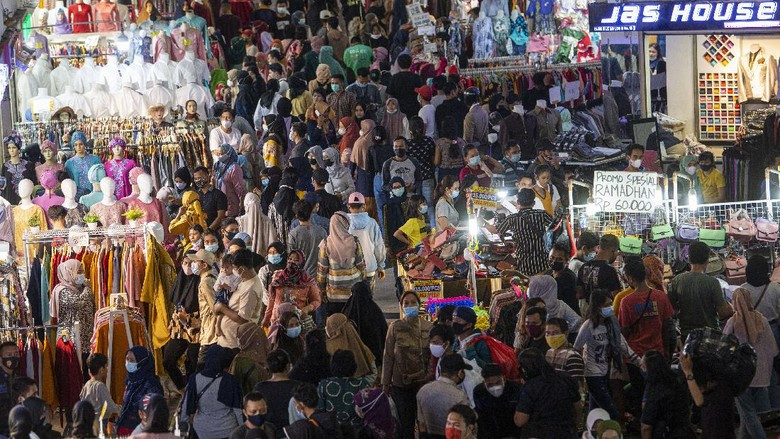Ramadan bustle raises specter of COVID-19 surge
Shopping centers, transportation hubs packed ahead of holiday
Change Size

A
uthorities have warned of another surge in COVID-19 cases ahead of the Idul Fitri holidays as people begin to crowd into shopping centers, restaurants and places of worship with their guard against the virus lowered, or return to their hometowns despite restrictions.
Some 183,000 people thronged the famous Tanah Abang Market in Central Jakarta last weekend, representing almost twice as much as the markets' capacity. Pictures of visitors walking shoulder to shoulder in the jam-packed market -- many not wearing masks -- made the rounds on social media, sparking a backlash from the public and experts who said the Jakarta administration had failed to anticipate the crowds.
But city secretary Marullah Matali blamed it on a lack of manpower, saying Jakarta COVID-19 task force officers patrolling the market could not do much when outnumbered by market visitors.
Tanah Abang is believed to be the largest textile market in Southeast Asia and is home to about 10,000 tenants. The market is typically at its busiest during Ramadan and ahead of Idul Fitri, when people come from all over the country to either purchase goods in bulk to resell in their home regions or simply for holiday shopping.
Authorities closed the market during Ramadan last year as part of the city's COVID-19 control, unlike this year during which they have permitted the market to remain open.
Criticism over the market’s overcrowding has prompted the Jakarta administration to limit the number of visitors to a maximum of 50 percent of the market capacity and order shops to open for shorter hours, starting from Monday.
Jakarta Governor Anies Baswedan has also deployed hundreds of Public Order Agency (Satpol PP) officers to help the city’s task force officers enforce safety protocols inside and around the market every day. He has even stopped commuter line services at the nearby Tanah Abang train station to discourage people from visiting the market, also starting from Monday.
Nonetheless, the market was densely packed with shoppers on Wednesday, although it was not as crowded as last weekend.
Read also: Yes, COVID-19 figures in Jakarta have dropped. But the public must remain alert
Another shopping center in South Jakarta, Mal Kota Kasablanca, appeared just as busy as Tanah Abang on Wednesday afternoon, with visitors packing the corridors and reserving spaces at restaurants for breaking-of-the-fast gatherings ahead of dusk. Based on The Jakarta Post's observation, visitors were able to freely walk in and out of the mall at many points without going through the usual body temperature checks set up as COVID-19 safety measures.
Social distancing was also not observed in most cases, especially in the long lines that snaked in front of popular chain restaurants on the mall's lower ground level. Attempts to control the flow of people by introducing one-way lanes also faltered, as security personnel struggled to keep tabs on the influx of visitors.
Holiday shopping crowds found across Indonesia
Similar scenes have appeared in many shopping malls and markets outside Jakarta, including Klewer Market in Central Java's Surakarta, Medan's central market in North Sumatra and Kapasan Market in East Java's Surabaya.
Epidemiologist Dewi Nur Aisyah of the national COVID-19 task force’s expert panel said that the number of shopping center visitors nationwide had been growing since the second week of Ramadan and was expected to continue rising in the days leading to the Idul Fitri holidays on May 12 and 13. She said some regions recorded up to 50 percent increases in shopping center visits.
Read also: New variants expose loopholes in contact tracing
"The tradition of shopping ahead of the Idul Fitri holidays is very good to [help boost] the country's economy, but flocking to shopping centers while ignoring health rules will only threaten our efforts to control COVID-19 transmissions," national COVID-19 task force spokesperson Wiku Adisasmito said on Sunday.
Ramadan tradition, relaxed restrictions and enforcement are factors
Experts believe the urge to maintain Ramadan traditions and have a merry holiday, coupled with a false sense of security following gradual vaccination, pandemic fatigue, lax restrictions and their enforcement during this year's Ramadan, are the reasons people are ignoring safety protocols.
Read also: Muslims welcome Ramadan amid COVID-19 restrictions
Unlike last year, the central government has permitted mosques to remain open at half capacity during Ramadan with mandatory physical distancing and mask wearing. It also allows people to hold breaking-of-the-fast gatherings at public places at 50 percent of capacity.
Daily COVID-19 cases nationwide have steadily dropped since January, when the country recorded daily highs of over 14,500 cases, to an average of 5,100 cases in the week of April 25 to May 1. But daily cases have plateaued since Ramadan started on April 12, with 19 out of a total 34 provinces having also reported an increase in active cases.
Infection clusters linked to Ramadan activities and ‘mudik’ detected
Health authorities recently found at least four new infection clusters that emerged from congregational tarawih (evening Ramadan prayers), breaking-the-fast and takziah (comforting the bereaved in Islam) gatherings, as well as mudik (exodus), which has recently amplified concerns over exponential rise in cases.
Read also: Jakarta sees surge in workplace clusters as people lower their guard after vaccination
The government has prohibited the Idul Fitri mudik starting from Thursday until May 17, but people are finding their way around the ban, with many starting their journeys earlier, before the ban takes effect.
On Wednesday, about 9,000 passengers left Pasar Senen railway station in Central Jakarta for mudik trips, while a spike in mobility was reported at Soekarno-Hatta International Airport in Tangerang, Banten, and on the Cikopo-Palimanan (Cipali) toll road between Jakarta and Cirebon, West Java.
Last year, Indonesia saw a spike in infections across the country following the Idul Fitri holidays, particularly after thousands of people violated the mudik ban. In the weeks following Idul Fitri, nationwide cases rose by around 68-93 percent while fatalities climbed by 28-66 percent









